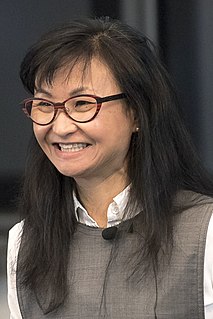
Digital media refers to any communication media that operate in conjunction with various encoded machine-readable data formats. Digital media can be created, viewed, distributed, modified, listened to, and preserved on a digital electronics device. Digital defines as any data represented by a series of digits, and media refers to methods of broadcasting or communicating this information. Together, digital media refers to mediums of digitized information broadcast through a screen and/or a speaker. This also includes text, audio, video, and graphics that are transmitted over the internet for viewing or listening to on the internet.

Sherry Turkle is the Abby Rockefeller Mauzé Professor of the Social Studies of Science and Technology at the Massachusetts Institute of Technology. She obtained an BA in Social Studies and later a PhD in Sociology and Personality Psychology at Harvard University. She now focuses her research on psychoanalysis and human-technology interaction. She has written several books focusing on the psychology of human relationships with technology, especially in the realm of how people relate to computational objects.
Technological convergence, also known as digital convergence, is the tendency for technologies that were originally unrelated to become more closely integrated and even unified as they develop and advance. For example, watches, telephones, television, computers, and social media platforms began as separate and mostly unrelated technologies, but have converged in many ways into interrelated parts of a telecommunication and media industry, sharing common elements of digital electronics and software.
Media ecology theory is the study of media, technology, and communication and how they affect human environments. The theoretical concepts were proposed by Marshall McLuhan in 1964, while the term media ecology was first formally introduced by Neil Postman in 1968.
Network society is the expression coined in 1991 related to the social, political, economic and cultural changes caused by the spread of networked, digital information and communications technologies. The intellectual origins of the idea can be traced back to the work of early social theorists such as Georg Simmel who analyzed the effect of modernization and industrial capitalism on complex patterns of affiliation, organization, production and experience.

Digitality is used to mean the condition of living in a digital culture, derived from Nicholas Negroponte's book Being Digital in analogy with modernity and post-modernity.

Henry Jenkins III is an American media scholar and Provost Professor of Communication, Journalism, and Cinematic Arts, a joint professorship at the University of Southern California (USC) Annenberg School for Communication and Journalism and the USC School of Cinematic Arts. He also has a joint faculty appointment with the USC Rossier School of Education. Previously, Jenkins was the Peter de Florez Professor of Humanities as well as co-founder and co-director of the Comparative Media Studies program at the Massachusetts Institute of Technology (MIT). He has also served on the technical advisory board at ZeniMax Media, parent company of video game publisher Bethesda Softworks. In 2013, he was appointed to the board that selects the prestigious Peabody Award winners.

Digital rhetoric can be generally defined as communication that exists in the digital sphere. As such, digital rhetoric can be expressed in many different forms —including but not limited to text, images, videos, and software. Due to the increasingly mediated nature of our contemporary society, there are no longer clear distinctions between digital and non-digital environments. This has led to an expansion of the scope of digital rhetoric as there is a need to account for the increased fluidity with which humans interact with technology.
Technoculture is a neologism that is not in standard dictionaries but that has some popularity in academia, popularized by editors Constance Penley and Andrew Ross in a book of essays bearing that title. It refers to the interactions between, and politics of, technology and culture.
Transmedia storytelling is the technique of telling a single story or story experience across multiple platforms and formats using current digital technologies.
Participatory culture, an opposing concept to consumer culture, is a culture in which private individuals do not act as consumers only, but also as contributors or producers (prosumers). The term is most often applied to the production or creation of some type of published media.
Identity tourism may refer to the act of assuming a racial, ethnic, socioeconomic, sexual or gender identity for recreational purposes, or the construction of cultural identities and re-examination of one’s ethnic and cultural heritage from what tourism offers its patrons.

The sociology of the Internet involves the application of sociological theory and method to the Internet as a source of information and communication. The overlapping field of digital sociology focuses on understanding the use of digital media as part of everyday life, and how these various technologies contribute to patterns of human behavior, social relationships, and concepts of the self. Sociologists are concerned with the social implications of the technology; new social networks, virtual communities and ways of interaction that have arisen, as well as issues related to cyber crime.

Remix: Making Art and Commerce Thrive in the Hybrid Economy is Lawrence Lessig's fifth book. The book was made available for free download and remixing under the CC BY-NC Creative Commons license via Bloomsbury Academic. It is still available via the Internet Archive. It details a hypothesis about the societal effect of the Internet, and how this will affect production and consumption of popular culture to a "remix culture".

Astra Taylor is a Canadian-American documentary filmmaker, writer, activist, and musician. She is a fellow of the Shuttleworth Foundation for her work on challenging predatory practices around debt.

Lisa Nakamura is an American professor of media and cinema studies, Asian American studies, and gender and women’s studies. She teaches at the University of Michigan, Ann Arbor, where she is also the Coordinator of Digital Studies and the Gwendolyn Calvert Baker Collegiate Professor in the Department of American Cultures.

Cyborg anthropology is a discipline that studies the interaction between humanity and technology from an anthropological perspective. The discipline offers novel insights on new technological advances and their effect on culture and society.
Democratization of technology refers to the process by which access to technology rapidly continues to become more accessible to more people. New technologies and improved user experiences have empowered those outside of the technical industry to access and use technological products and services. At an increasing scale, consumers have greater access to use and purchase technologically sophisticated products, as well as to participate meaningfully in the development of these products. Industry innovation and user demand have been associated with more affordable, user-friendly products. This is an ongoing process, beginning with the development of mass production and increasing dramatically as digitization became commonplace.

Wendy Hui Kyong Chun is the Canada 150 Research Chair in New Media in the School of Communication at Simon Fraser University. Previously, she was Professor and Chair of Modern Culture and Media at Brown University. Her theoretical and critical approach to digital media draws from her training in both Systems Design Engineering and English Literature. She is a leader at the Digital Democracies Institute at Simon Fraser University, Chun is a member of the directorial team at the digital democracies institute which is made up of a collective of people involved with the school of communication at Simon Fraser University.
In media studies and marketing, spreadability is the wide distribution and circulation of information on media platforms.











